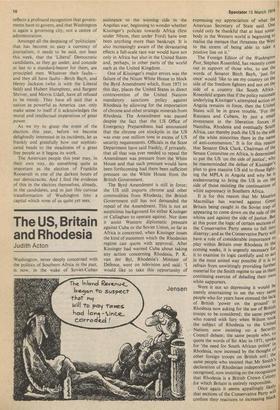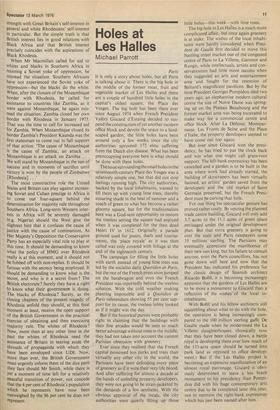The US, Britain and Rhodesia
Judith Acton
Washington, never deeply concerned with the politics of Southern Africa in the past, is now, in the wake of Soviet-Cuban assistance to the winning side in the Angolan war, beginning to wonder whether Kissinger's policies towards Africa (first under Nixon, then under Ford) have ever been anything more than bankrupt. It is also increasingly aware of the devastating effects a full-scale race war would have not only in Africa but also in the United States and, perhaps, in other parts of the world such as the United Kingdom.
One of Kissinger's major errors was the failure of the Nixon White House to block the Byrd Amendment which, from 1971 to this day, places the United States in direct contravention of the United Nations mandatory sanctions policy against Rhodesia by allowing for the importation of chrome and other strategic minerals from Rhodesia. The Amendment was passed despite the fact that the US Office of Emergency Preparedness had announced that the chrome ore stockpile in the US was over one million tons in excess of US security requirements. Officials in the State Department have said frankly, if privately, that all that was ever needed to repeal the Amendment was pressure from the White House and that such pressure would have been forthcoming had there been sufficient pressure on the White House from the British Government.
The Byrd Amendment is still in force; the US still imports chrome and other commodities from Rhodesia; the British Government still has not demanded the repeal of the Amendment. This is not an auspicious background for either Kissinger or Callaghan to operate against. Nor does it assist Western diplomatic pressure against Cuba or the Soviet Union, so far as Africa is concerned, when Kissinger issues the kind of statement which the Rhodesian regime can quote with approval. After Kissinger had warned Cuba about taking any action concerning Rhodesia, P. K. van der Byl, Rhodesia's Minister of Defence, went on television and said: '1 would like to take this opportunity of expressing my appreciation of what the American Secretary of State said. One
could only be thankful that at least somebody in the Western world is beginning to realise the menace that threatens the West to the extent of being able to take a positive line on it.'
The Foreign Editor of the Washington Post, Stephen Rosenfeld, has recently come out in support of those who, to use the words of Senator Birch Bayh, 'just for once' would `like to see my country on the side of the freedom fighters and not on the side of a country like South Africa.
Rosenfeld argues that if the policy rationale underlying Kissinger's attempted action on Angola remains in force, then the United
States will be in grave trouble. `For the Russians and Cubans, by just a strati
investment in the liberation forces la Namibia, Rhodesia and eventually South Africa, can thereby push the US to the side of the white minorities there in the name of anti-communism.' It is for this reason that Senator Dick Clark, Chairman of the Senate Committee on Africa, is determined to put the US 'on the side of justice', why he masterminded the defeat of Kissinger s
plan to give massive US aid to those fight" ing the MPLA in Angola and why he is endeavouring to bring the US in on the side of those resisting the continuation ei white supremacy in Southern Africa. ,
ft is for this reason that Mr Maurice Macmillan has warned against Great Britain being' caught in the Soviet trap of
appearing to come down on the side of the whites and against the side of justice. Dot
at this point the logic of certain sections of
the Conservative Party seems to fall int°, disarray; and as the Conservative Party will
have a role of considerable importance to
play within Britain over Rhodesia in the coming weeks, it is urgently necessary for
it to examine its logic carefully and to act
in the most united way possible if it is t° refrain from unwittingly providing furthey
material for the Smith regime to use in their continuing exercise of deluding their ovio white supporters. Were it not so depressing it would be merely entertaining to see the very same people who for years have stressed the lack
of British `power on the ground' .1° Rhodesia now asking for the use of British troops to be considered; the same People
who roared with fury when Wilson took the subject of Rhodesia to the United
Nations now insisting on a Security Council debate; the same people who, t° quote the words of Sir Alec in 1971, spolt,e for 'the need for South African police Rhodesia, now incensed by the thought ot other foreign troops on British soil;. th,e same people who insisted that, Mr Smith s declaration of Rhodesian independence, be recognised, now insisting on the recognition that Rhodesia is a British Crown Colon)! for which Britain is entirely responsible. ,
Once again it seems appallingly that sections of the Conservative Party vo,_ confuse their reactions to increasing black'. strength with Great Britain's self-interest in general and white Rhodesians' self-interest In particular. But the simple truth is that British interest lies in good relations with Black Africa and that British interest Precisely coincides with the aspirations of Black Rhodesia.
When Mr Macmillan called for aid to Whites and blacks in Southern Africa in resisting a Soviet yoke of oppression, he Misread the situation. Southern Africans have not experienced the Soviet yoke of Oppression—but the blacks do the white. When, after the closure of the Mozambique border with Rhodesia, he called for assistance to countries like Zambia, as it were against Mozambique, he again misread the situation. Zambia closed her own border with Rhodesia in January 1973. That was the time to call for increased aid for Zambia. When Mozambique closed its border Zambia's President Kaunda was the first statesman to come out in full support of that action. 'The cause of Mozambique ts the cause of Zambia; an attack on Mozambique is an attack on Zambia . . . We will stand by Mozambique in the sun of success and in moments of sacrifice until victory is won by the people of Zimbabwe [Rhodesia] The most constructive role the United States and Britain can play against increasing Soviet and Cuban prestige in Africa is to come out four-square behind the determination for majority rule throughout Southern Africa. Long-term Western interests in Africa will be severely damaged (e.g. Nigeria) should the West give the Slightest hint that it confuses the cause of justice with the cause of communism. As Her Majesty's Opposition the Conservative Party has an especially vital role to play at this time. It should be demanding to know What the policy of HMG over Rhodesia really is at this moment, and it should not be fobbed off with non-replies. It should be furious with the secrecy being employed. It should be demanding to know what is the secret, and who is it a secret from ? The British electorate? Surely they have a right to know what their government is doing. The blacks of Rhodesia? Surely, as the Closing chapters of the present tragedy of Rhodesia unfold they should, at this final moment at least, receive the open support of the British Government in the practical exercise of obtaining and then exercising majority rule. The whites of Rhodesia? Now, more than at any other time in the Past the whites of Rhodesia need the assistance of Britain in tearing aside the shrouds of propaganda with which they have been enveloped since UDI. Now, more than ever, the British Government must urgently inform them of the dire peril they face should Mr Smith, while there is Yet a moment of time left for a relatively Peaceful transition of power, not concede that the 4 per cent of Rhodesia's population Which he represents have now been Outweighed by the 96 per cent he does not represent.



































 Previous page
Previous page